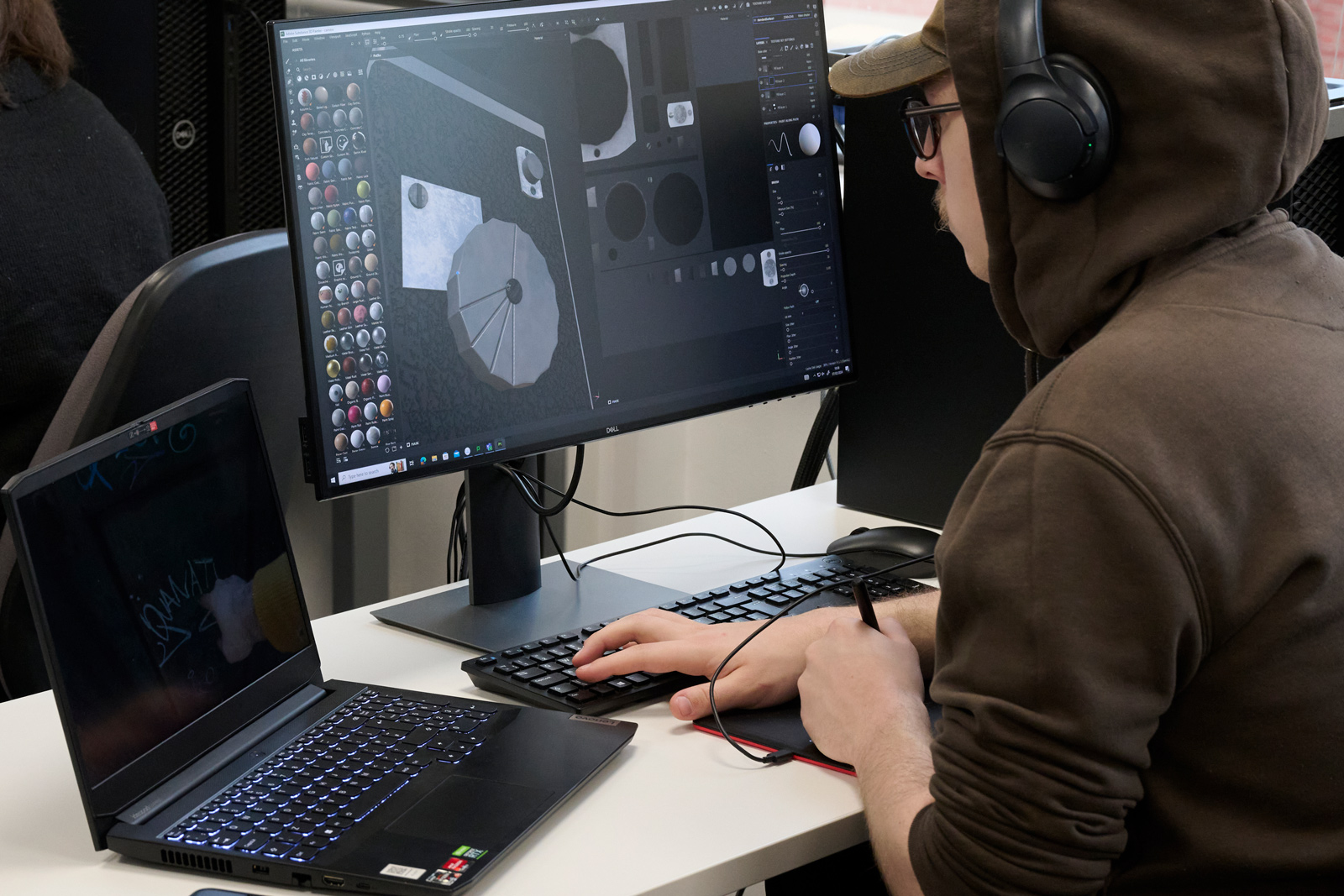
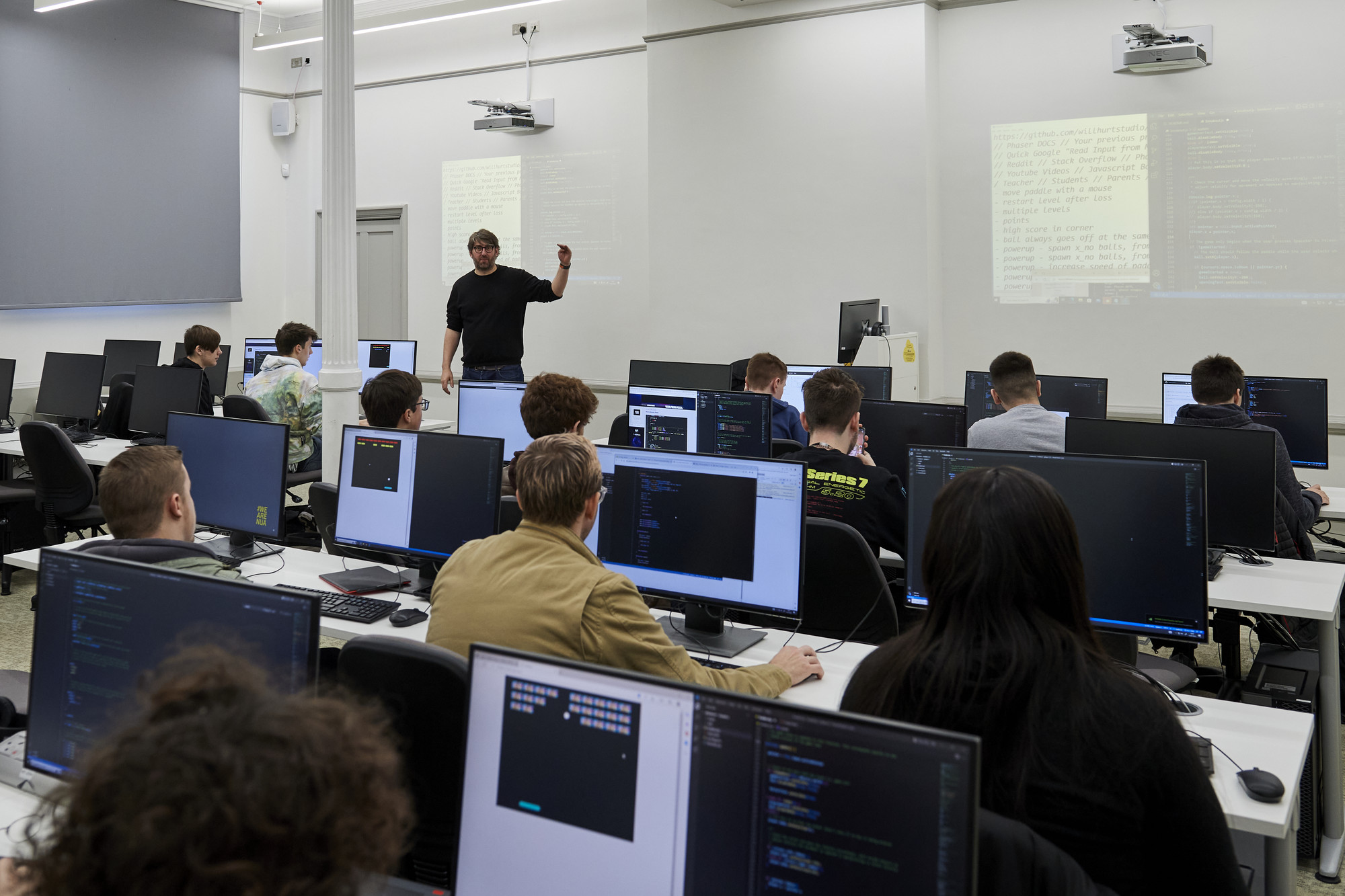
Games Computing MSc
Gain the skills to develop software, systems, and content for modern video games, preparing you for a career in the computer games industry.
-
Course Duration
Full-time 1 year
-
Annual Fees
- Home (full-time) £11,000
- Overseas (full-time) £24,000
-
Course Start
September 2026
- How to Apply Request a prospectus (opens in a new window)
The MSc in Games Computing builds on your previous knowledge of gaming and prepares you for advanced technical roles in the games industry. This cutting-edge course supports the development of advanced techniques and technologies aligned with computing.
The curriculum will enhance your capacity to write code, develop software, and use relevant platforms and game engines to produce new gaming experiences. This expands your understanding of advanced professional technologies and behaviours, enabling you to resolve complex issues systematically and precisely. This course focuses on developing, iterating, and implementing game software. Through project-based approaches, you will enhance your skills in programming languages, game engines, computational visualisation, coding, and virtual networks.
The course encourages a critical approach to games computing, considering the social and ethical implications of your work. By the end, you will have created a professional body of work, confident in applying programming languages to industry-standard solutions and technical problem-solving, clearly communicating your results within the games industry.
Why study with us
-
Advanced technical skills
Develop your expertise in advanced programming languages, game engines, computational visualisation, and virtual networks to create sophisticated, clean, and efficient code.
-
Interdisciplinary approach
Benefit from shared delivery with other postgraduate courses, fostering a collaborative environment that reflects industry practices and promotes knowledge-sharing and interdisciplinary interaction.
-
Professional-level resources
Utilise a wide range of professional resources, including industry standard tools, media labs, 2D & 3D studios and workshops, computer labs, high-specification PCs, digital darkrooms, analogue and digital resources, and licensed specialist software, supporting you to create practical and creative solutions to project briefs.
-
Ethical and inclusive research
Adopt an ethical approach to your work, focusing on the social and ethical implications of games computing, and emphasising accessibility, equality, diversity, and sustainability.
-
Professional portfolio development
By the end of the course, you will have created a professional body of work that reflects your interests and prepares you for industry, enhancing your ability to communicate research visually.
-
Innovative problem solving
Engage with complex computational problems through project-based learning, promoting original and innovative approaches to technical proficiency and professional working methods.
Course Details
This programme is a one-year course, including 30 weeks of direct teaching time and a 15-week final project. You will need to complete five units and one 60-credit major project (180 credits in total). All units on the course are compulsory and must be passed in order to complete the award. If you study part-time your modules will be split across two years. Full course details, including aims and assessment criteria, will be provided in the course specification upon validation.
Core practice and context in Games Computing (60 credits)
This unit launches your master’s study experience at Norwich, encouraging you to explore leading practices and emerging research in game computing, focusing on a broad understanding of processes within conceptual and cultural contexts. Through discovery-based learning, you will develop a deep knowledge of programming, data analysis, visualisation, mathematics, physics, information systems, networks, physical computing, prototyping, and emerging technologies like AR/VR/AI. This unit encourages an expanded approach to creative thinking, examining broader systems and the interconnected boundaries of games computing with other fields. Research-led projects and iterative experimentation will enhance your critical reflection and analytical skills, helping you learn how to use games computing and technology to address cultural and contemporary issues. This hands-on approach encourages innovative thinking and practical application, preparing you to tackle real-world challenges in the creative industries.
Advanced technical skills in Games Computing (20 credits)
This unit focuses on developing advanced games computing skills essential for idea generation, problem-solving, and practical development. It includes a range of media and processes, focusing on technical expertise to address theoretical and conceptual challenges. Through individual and group projects, students are encouraged to explore innovative solutions for contemporary and emerging media platforms. The unit will cover programming, custom software practices, physical computing, machine learning, systems engineering, advanced visualisation, electronic prototyping, and emerging technologies like AR/VR/AI. The unit emphasizes iterative cycles of experimentation, enhancing practical skills and methods to advance your creative outcomes and knowledge.
Dialogue, debate and domain knowledge in Games Computing (10 credits)
This unit explores leading practices and emerging research in creative technology practice, enhancing your understanding through reflective analysis and interactive sessions. It examines the discipline within socio-economic, political, ethical, and cultural contexts, covering themes like machine learning theory, games theory, human-computer interaction, and globalisation. Students will develop diverse research approaches and engage in discursive interactions to inform their inquiry methods, examining the boundaries between creative technology disciplines. The unit looks at primary and secondary research methodologies, presentations, and critical reflective writing, positioning you as a critically engaged practitioner ready to contribute to contemporary and cultural debates.
Professional technical skills in Games Computing (20 credits)
This unit focuses on advanced professional-level technical skills essential for innovative games computing practice. Building on the ‘advanced technical skills’ unit, it encourages experimentation across various media to enhance personal development and practical skills. You will learn the importance of technical expertise in supporting theoretical and conceptual aspects of computational design and prototyping. Through individual and group projects, students will refine their computing processes and explore innovative solutions, particularly in digital environments. The unit integrates custom software practices, physical computing, algorithmic design, and emerging technologies like AR/VR/AI. Focusing on contemporary techniques, you will blend theoretical concepts with technical skills, enabling you to create innovative and complex outcomes, essential for advancing in the dynamic games computing industry.
Advanced critical context in Games Computing (10 credits)
This unit deepens knowledge of leading practices and emerging research in creative technology and games computing. By developing effective research and reflective strategies, you will enhance your critical understanding of key methodologies and gain insights into creative thinking within socio-economic, political, ethical, and cultural contexts. Building on prior knowledge from the ‘dialogue, debate, and domain knowledge’ unit, it emphasises developing effective research and reflective strategies to understand creative communication in various contexts. The unit includes interactive sessions that explore critical frameworks, covering themes like machine learning theory, game theory, human-computer interaction, and globalisation. Hands-on projects and iterative analysis cycles will reinforce the synthesis of conceptual and practical problem-solving, positioning you as critically engaged reflective practitioners.
Major project (60 credits)
This unit represents the culmination of your games computing studies, integrating everything you’ve learned on your studies. You will identify a research question, plan a project to test hypotheses, and work towards innovative outcomes, which may involve multiple outputs or a focused exploration of one aspect of your practice, supported by feedback from tutors and industry professionals. You will be encouraged to support the historical, theoretical, cultural, technical, and economic contexts relevant to your discipline and project. You will examine challenges related to social and environmental sustainability, identifying relevant industries, audiences, and stakeholders. Research-led practice will enhance your ability to synthesise experiments into complex creative outcomes, positioning you as a critically engaged and reflective professional who can synthesise experiments and ideas into complex creative outcomes.
Download course specifications
Learning and teaching
The course is delivered through a variety of engaging learning and teaching methods.
-
Lectures
-
Seminars
-
Tutorials
-
Technical labs
-
Independent and group work
Assessment
Our assessment methods will vary based on the unit you choose and provide a comprehensive measure of your learning and progress. These methods may include:
- Critically reflective essay
- Course work
- Presentations
- Learning journal
- Reflective evaluation
- Body of creative work
- Reflective research report
- Team project evaluation
- Major project
- Supporting documentation
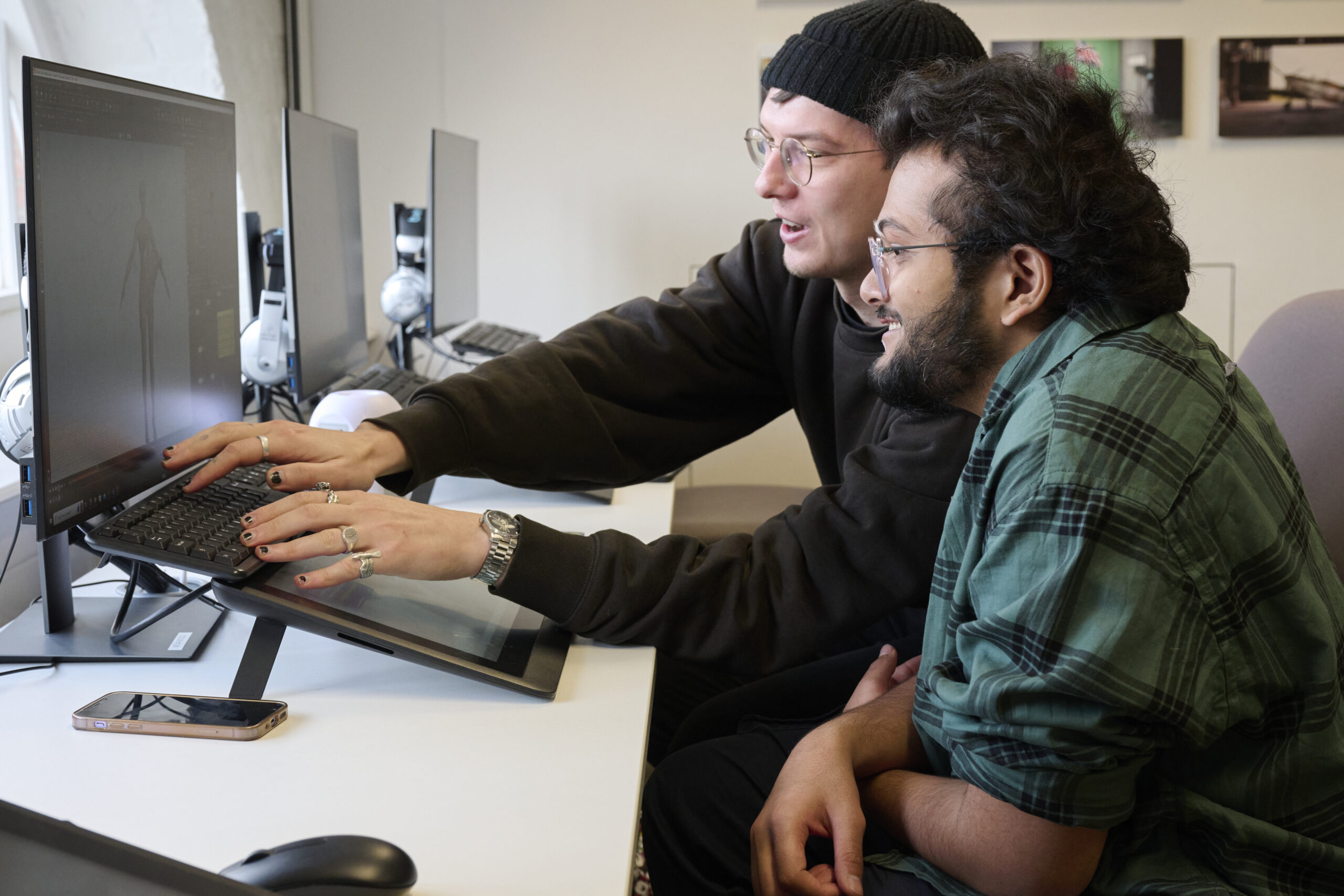
Typical career paths
Our MA in Games Computing equips graduates with the creative and technical expertise required for a wide range of roles within the games industry, including game designer, artist, developer and producer. The course provides versatile skills highly valued across other creative and tech industries, opening doors to careers in design, programming, production and much more. Throughout the course, you will develop strong project management abilities, teamwork, communication, leadership, and negotiation skills. You’ll gain hands-on experience with industry-standard tools and techniques, while also developing entrepreneurial acumen and business knowledge, which will support you as an independent developer or support your career in a larger games development studio.
This course prepares you for a career in a variety of disciplines related to games computing, including:
- Applications developer
- Game designer
- Game developer
- Game producer
- UI/UX designer
- Concept designer
- Multi-media programmer
- Multi-media specialist
- Software engineer
- VFX artist
- Indie game developer
The UK’s creative sector is thriving, contributing £111.7 billion annually to the economy and offering over 2 million jobs.
Department for Digital Culture Media and Sport (DCMS)
Entry Requirements
We typically require an honours degree of 2:1 or above. Applicants should have a good working knowledge of programming gained from work, university study, or personal interest. Details on your programming experience should be included as part of your application.
Those with industry experience or relevant skills from non-traditional backgrounds are encouraged to apply, including individuals currently employed. If you’re unsure about your eligibility, please contact us for guidance before applying.
English language requirements (International/EU)
If English is not your first language, IELTS 6.5 (or equivalent) is required, with a minimum of 5.5 in reading, writing, listening, and speaking. We also accept other English language qualifications.
International Qualifications
We accept a wide range of qualifications from all over the world.
For information on entry requirements from your country, see our international pages.
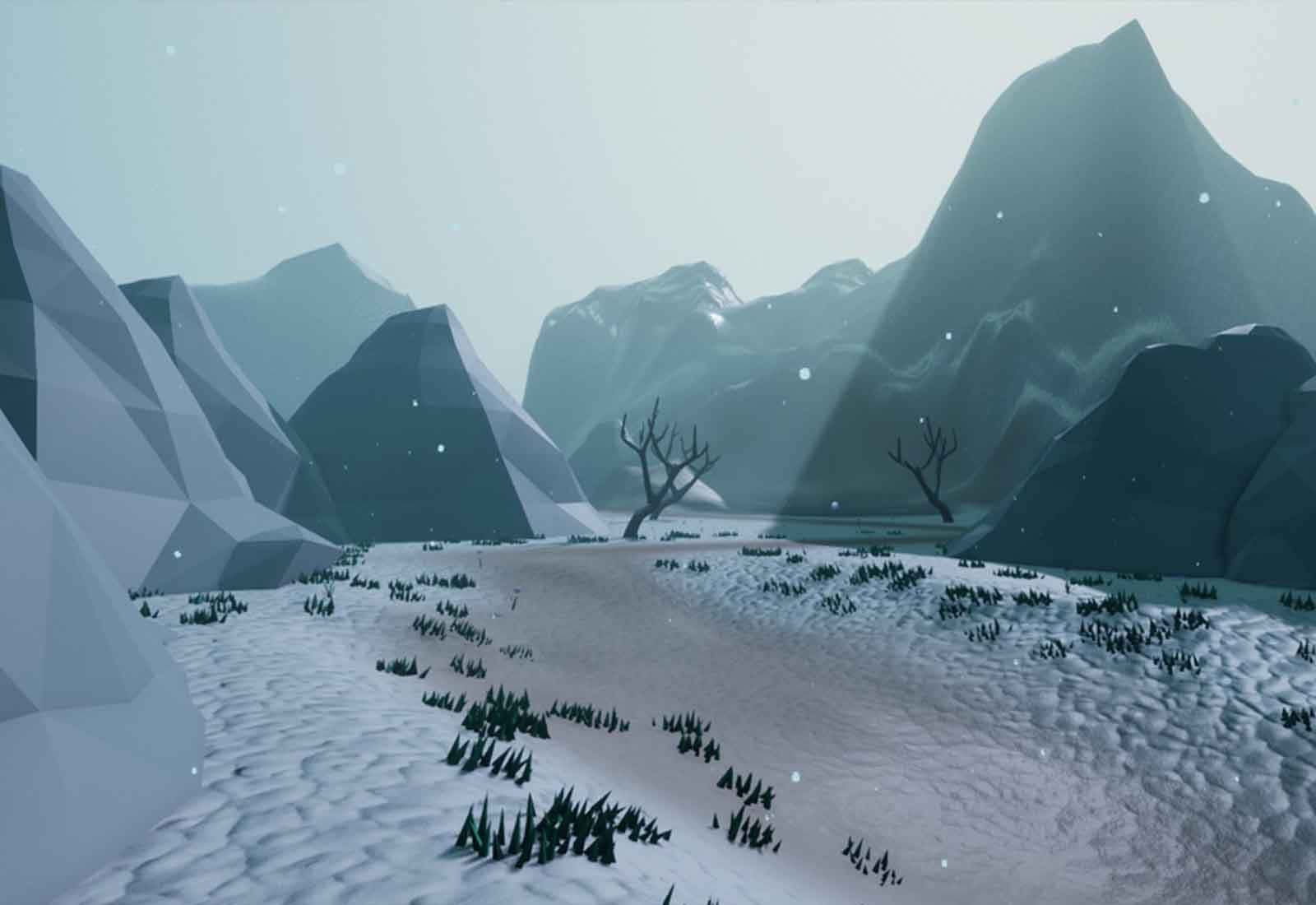
Fees and funding
Home
Tuition fees for the 2026/27 academic year
- Full time: £11,000
The level of fee that you will be asked to pay depends on whether you’re classed as a UK
(home) or international student. Check your fee status.
Fees for subsequent years
The rules for inflation on fees in subsequent years depend on the type of fee status and level
For Home and overseas postgraduate degree students starting in 2026, fees will remain the same for each year of your course.
Funding your study
Depending on your circumstances, you may qualify for a bursary, scholarship or loan to help fund your study and enhance your learning experience. Find out more about scholarships and funding.
International
Tuition fees for the 2026/27 academic year
- Full time: £24,000
The level of fee that you will be asked to pay depends on whether you’re classed as a UK
(home) or international student. Check your fee status.
Fees for subsequent years
The rules for inflation on fees in subsequent years depend on the type of fee status and level
For home and overseas postgraduate degree students starting in 2026, fees will remain the same for each year of your course.
Funding your study
We offer a range of scholarships and bursaries for international students. To find out more and see if you’re eligible, please visit the scholarships for international students page.
Additional costs
Your course fees cover the cost of studies, and include loads of benefits, such as the use of our library, support from our expert employability team, access to workshops and free use of the IT equipment across our campuses. There are also other costs which you may need to consider.
How to apply
Home
Applications to our postgraduate courses should be made directly to Norwich University of the Arts using a Postgraduate Application Form.
Applications should be returned to admissions@norwichuni.ac.uk
Please see our Terms and Conditions and Admissions Policies for further details.
International
Postgraduate applicants can only apply directly by completing the below online application form or emailing the downloadable form to ioadmissions@norwichuni.ac.uk
International students requiring a visa should apply as soon as possible in the year they wish to start. Email our International Team for more information. Please see our Terms and Conditions and Admissions Policies for further details
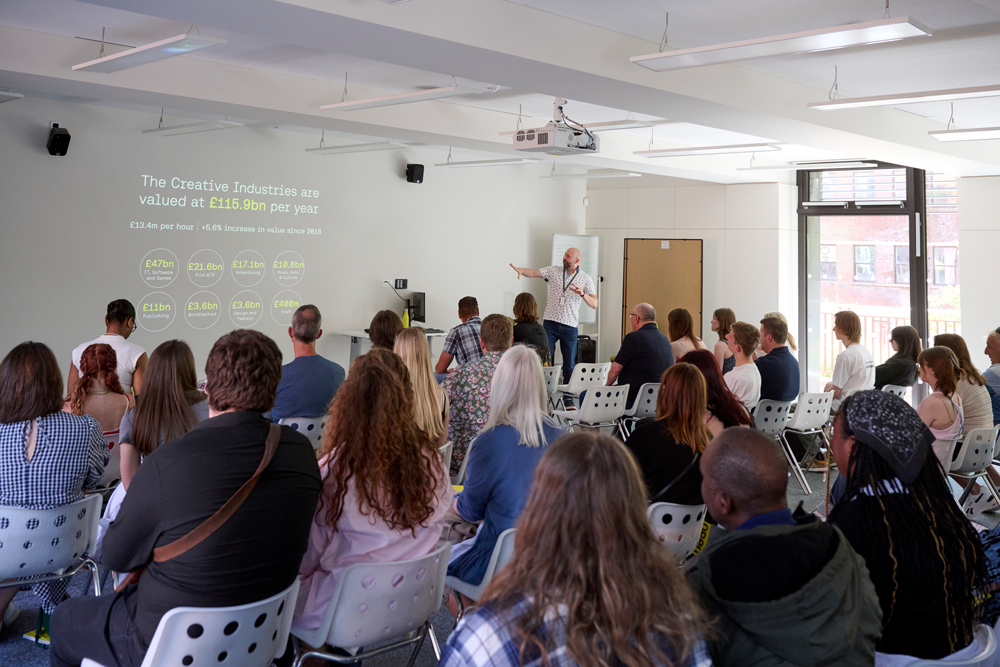
Latest news
-
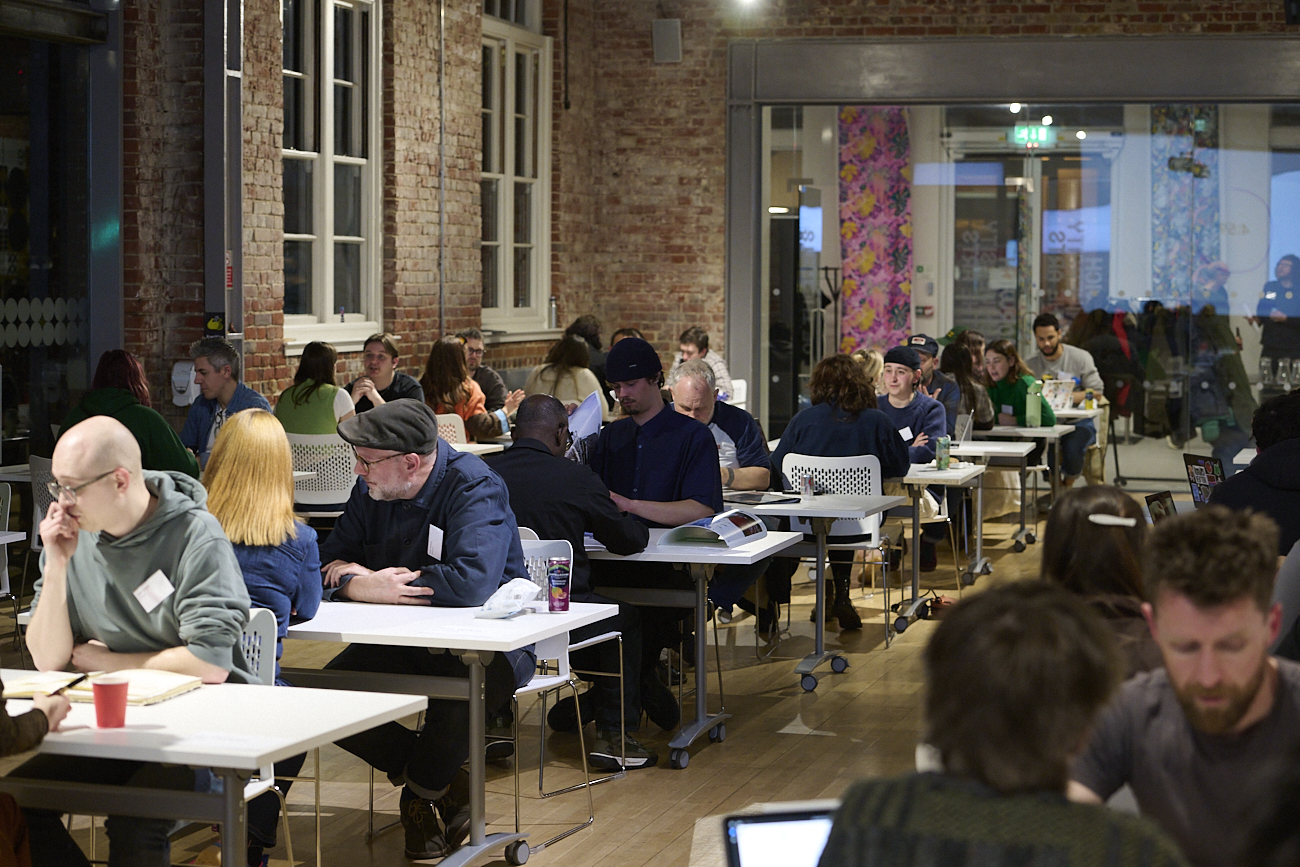 Employability •
Employability •Norwich University of the Arts celebrates 10 years of the Big Book Crit
Hundreds of Norwich students have shared their work with leading creative professionals over the last decade. -
 BA Business Management •
BA Business Management •Dean of Creative Education Awarded Prestigious Principal Fellowship from Advance HE
The University is delighted to announce that Hilary Carlisle, Dean of Creative Education and Professor of Design, has been awarded Principal Fellowship of the Higher Education Academy (PFHEA) by Advance HE -
 BA Business Management •
BA Business Management •In conversation with Norwich’s newest lecturers in Marketing and Business Management
We joined Norwich's newest lecturers, Stephen Balmer-Walters and Laurie McAllister, to find out more about the University's Marketing and Business Management courses. -
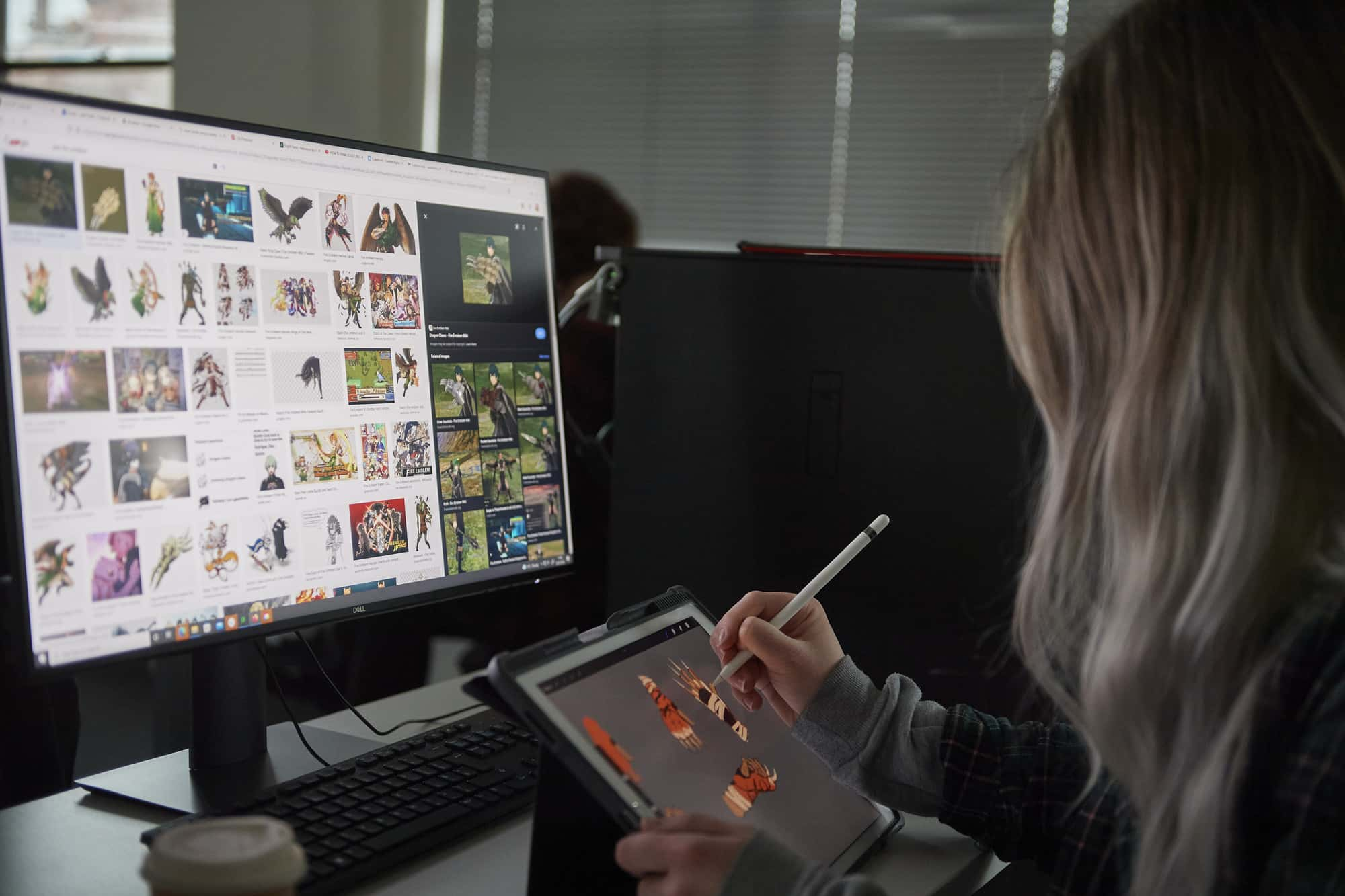 BA Games Art and Design •
BA Games Art and Design •East of England set to become UK’s next Games Cluster, says landmark report
A major new report is calling for the creation of a Games Cluster for the East of England — positioning the region as a national leader in creative technology and immersive media. -
 BA Animation •
BA Animation •Cutting edge Sony Virtual Production Studio puts Norwich on the map for the future of film and gaming
Norwich University of the Arts and Sony open new landmark facility for students, creators and the community. -
 BSc Degree •
BSc Degree •Norwich University welcomes new academics to its Psychology and Computer Science courses
Lyndsey Wallace joins the University as Senior Lecturer for BSc (Hons) Psychology, with Jawwad Chattha joining as Course Leader for BSc (Hons) Computer Science. -
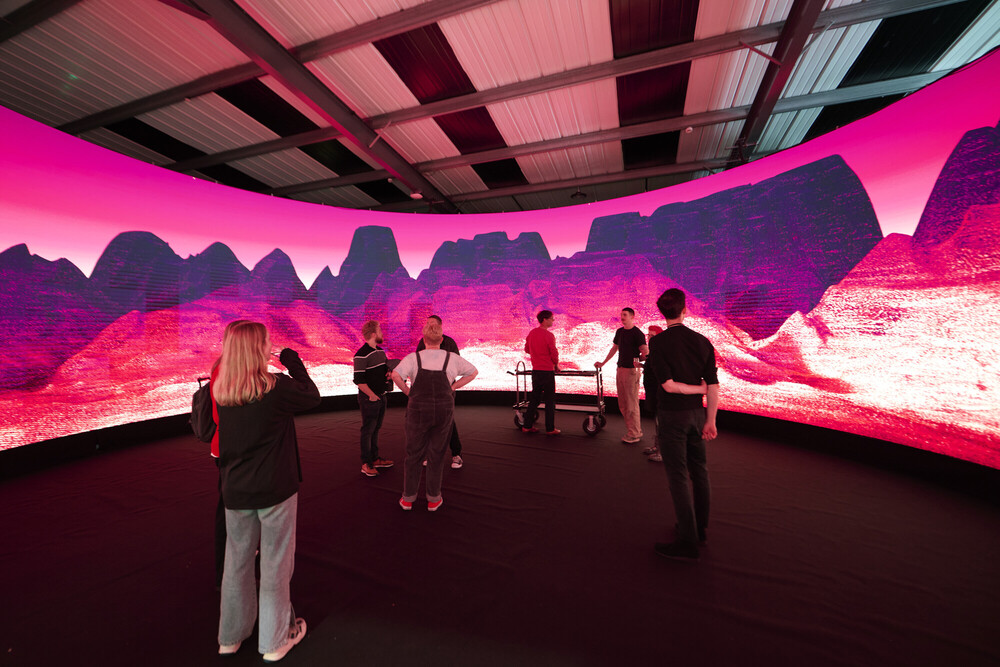 Institution •
Institution •Norwich University of the Arts Makes Historic Debut in Main Guardian University Guide
Norwich University of the Arts has marked a historic milestone, with its first-ever appearance in the Guardian University Guide’s national rankings. -
 Institution •
Institution •Norwich University of the Arts acquires Mechanism by artist Andrew Kearney
The kinetic installation, which transforms the sounds of Norwich into a daily light sequence, was commissioned in 2024 as a temporary intervention for the University’s historic Bank Plain building. -
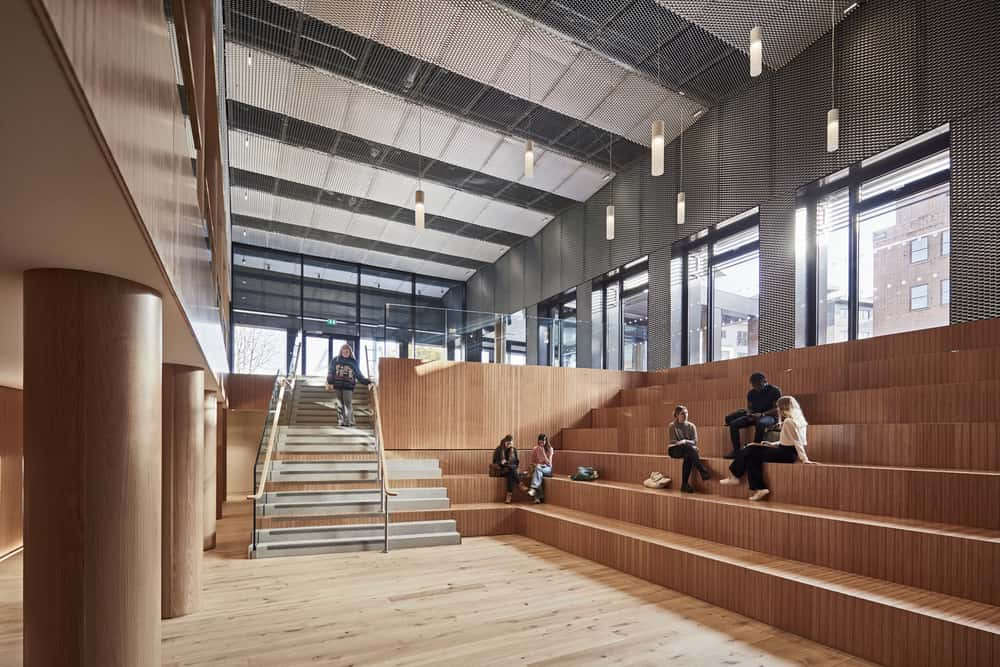 Cost of living support •
Cost of living support •Cost of living Support Package 2025-26
We are proud of the measures we introduced over the last few years and want to continue many of them in 2025/26 to ensure this support remains in place. -
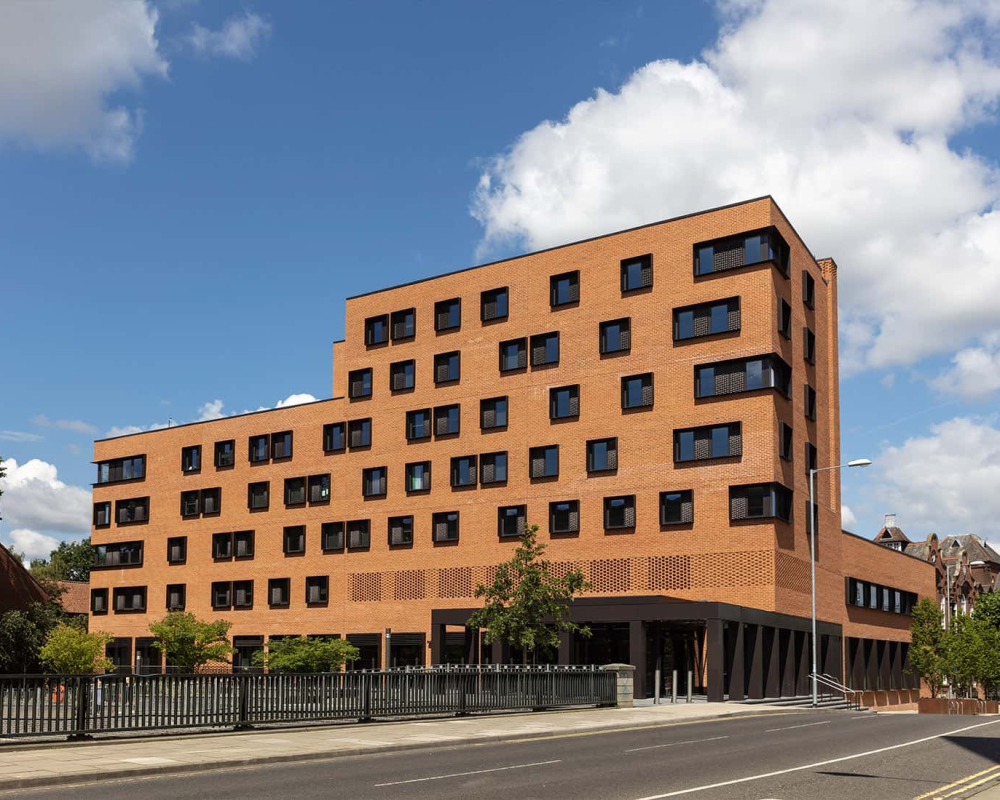 BA Degree •
BA Degree •Norwich University of the Arts moves up 25 places in The Complete University Guide
Norwich University of the Arts has been ranked among the UK's top two specialist creative arts universities — and the highest outside London — in the 2026 edition of The Complete University Guide -
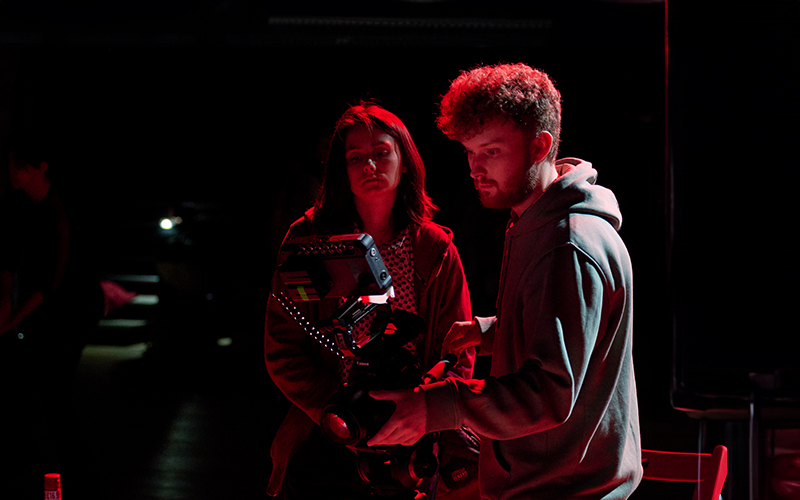 MA Communication Design •
MA Communication Design •What's the difference between undergraduate and postgraduate study?
We explore how postgraduate study could unlock your creative potential and future prospects. -
 Alumni •
Alumni •Fine Art graduate selected to exhibit at pioneering space research centre
Holly Sandiford has recently exhibited at Leicester's Space Park as part of Space: Science & Nature. -
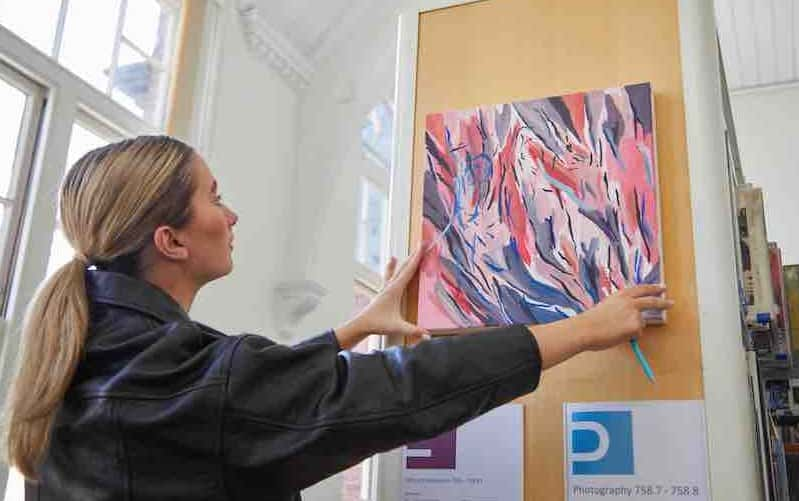 MA Degree •
MA Degree •MA Fine Art students curate exhibition takeover at NUA Library
The exhibition ‘Bibliotheca Interpellations’ showcased multi-disciplinary works by MA Fine Art. -
 MA Degree •
MA Degree •In conversation with: Michael Morgan, of Original Magazine
We talk to Michael about co-founding the multidisciplinary publication Original Magazine.
Related courses
Discover our courses and take the first step towards unleashing your potential
-
Visit the Creative Computing MSc course page
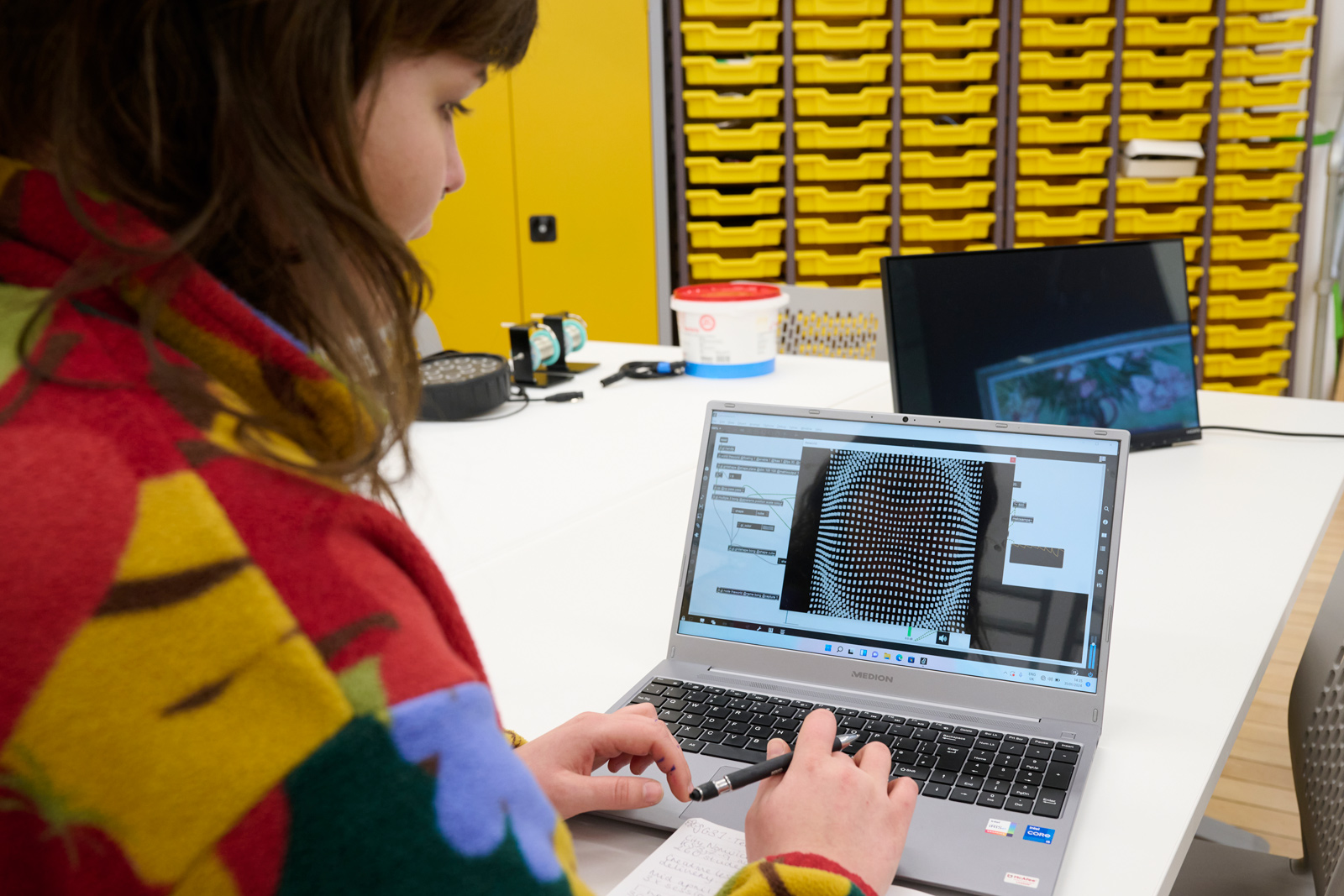
- Filter courses by study level: Postgraduate
- Filter courses by duration: Full time
- Filter courses by start month: September
- Filter courses by subject: Creative Computing
Creative Computing MSc
Discover how to use advanced programming and creative practice to design interactive experiences that push the boundaries of digital creativity.
-
Visit the Data Science and AI in Creative Industries MSc course page
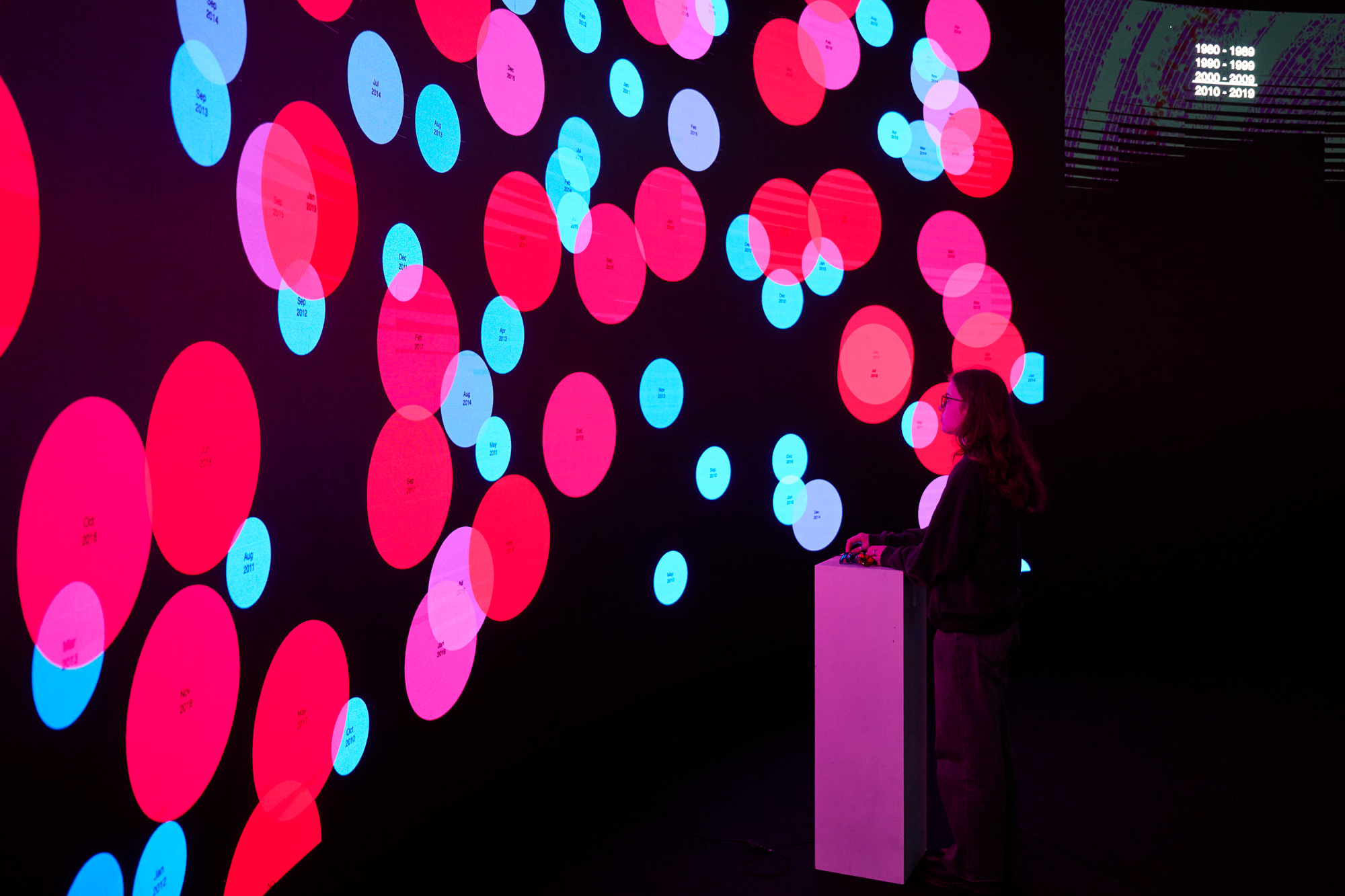
- Filter courses by study level: Postgraduate
- Filter courses by duration: Full time
- Filter courses by start month: September
- Filter courses by subject: Data Science and AI in Creative Industries
Data Science and AI in Creative Industries MSc
Learn how computer science, data analytics, and AI drive innovation and enhance everyday experiences in the creative industries.